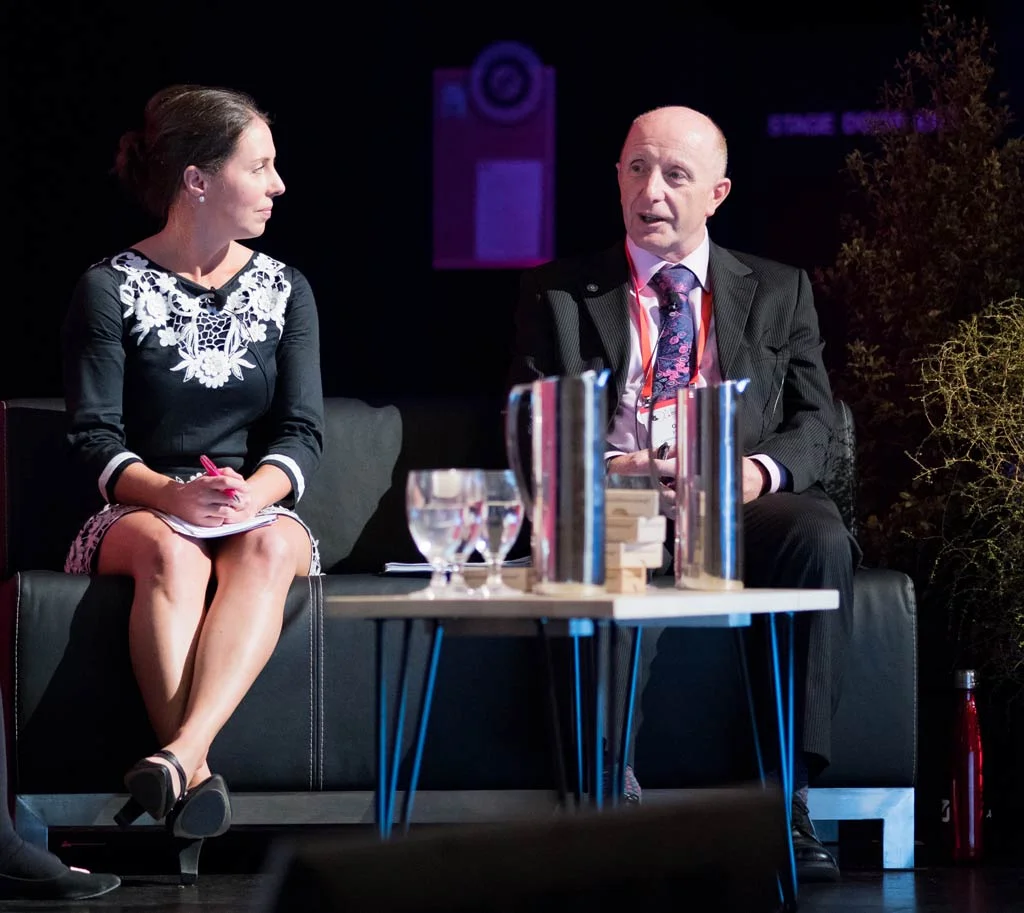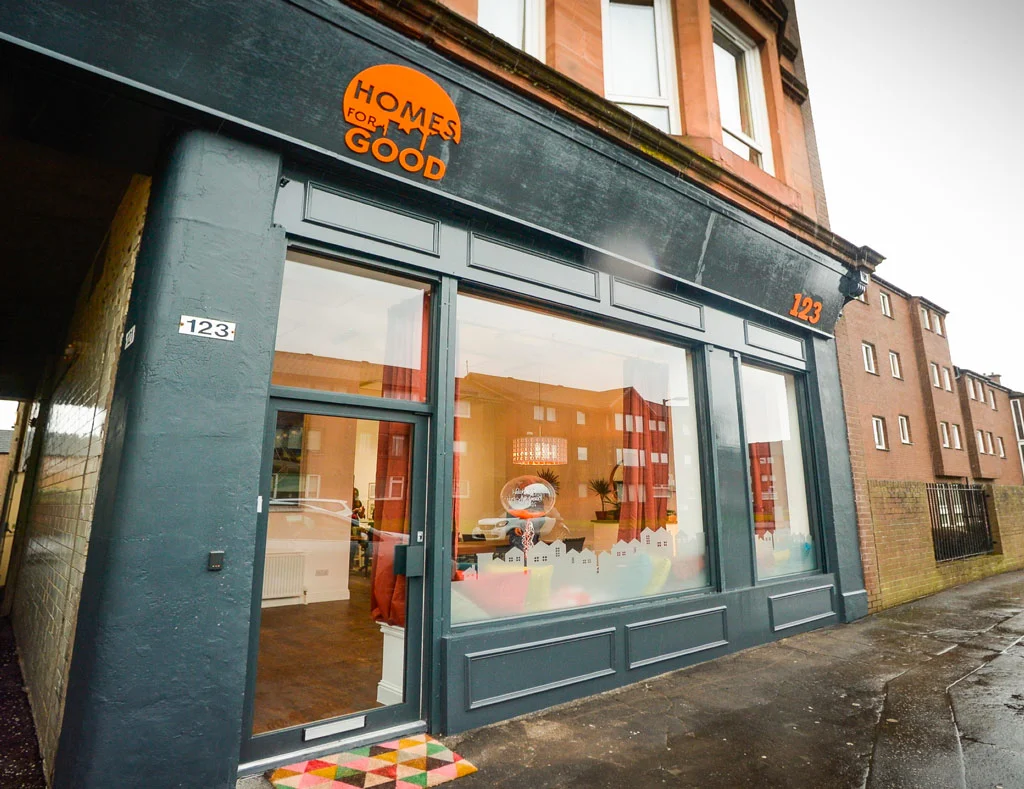What Can We Learn From Scotland's Thriving Social Enterprise Movement?
In the lead up to this year's Social Enterprise World Forum in Edinburgh, we're shining a spotlight on the key factors which have led to a thriving social enterprise movement in Scotland. What can we all learn from Scotland's approach to tackling community issues and building a social enterprising economy?
Deep insights from 12 global leaders have been compiled from our podcasts to help gain a better understanding into Scotland's social enterprise history. Experience and opinions are shared into a range of topics including Scotland's 10 year social enterprise strategy, whole-of-government support, investment funds and the growth of the ecosystem.
We're looking forward to continuing this discussion in September, when the majority of these interviewees, Impact Boom and many of the world's inspiring social entrepreneurs will gather for the World Forum. Remember, what you hear today are snippets and you can click on through to listen to the full interviews on impactboom.org
12 global leaders share their insights & experience into the Scottish social enterprise movement.
Highlights from the interviews (listen to the podcast for full details)
[Tom Allen] - To kick things off, in September last year, we spoke to Peter Holbrook, CEO of Social Enterprise UK. I pointed out that a number of our interviewees were pointing to the UK as a leader in the social enterprise space and asked Peter what countries he believed were really leading the charge when it came to social innovation. What was the UK doing that other countries around the world could learn from? Here's what Peter said...
[Peter Holbrook] - I think we can be overindulged around social innovation. In the UK, we've made a lot of progress. We've had about 15 or 20 years of constant policy initiative that have supported the growth and development of social enterprises. Against that backdrop, we've got growing poverty, growing homelessness, growing inequality. We've got health and social care crisis. Our education system is in crisis. The prospects for young people in this country are not as good as they should be. So, although, we can be carried away, flying the flag and saying, "haven't we done well", we have to recognise the context. And, that context is not entirely positive.
Other countries that are really kind of smashing it at the moment; you'll note that the UK is formed of four countries that form the Untied Kingdom. Scotland has its own government.
Scotland, for the last five, six, seven years, has been really, really driving the growth of social enterprise in a way that makes me, based in London, in England, quite envious.
They've got a 10 year social enterprise strategy, they believe in social enterprise as an economic model, not just as a handy way to deliver services to the public sometimes on a more cost efficient basis. They believe in building a socially enterprising economy. Scotland is smashing it at the moment.
[Tom Allen] - At the beginning of this year, we had the pleasure of speaking to one of the world's pioneers in social enterprise, Gerry Higgins. Beyond being a Director of the Social Enterprise World Forum, Gerry leads a range of other organisations responsible for growing the world's social enterprise ecosystem. I was keen to dig into the history of the U.K.'s first social enterprise strategy and asked Gerry to share his broad experience. Here's a snippet of our conversation...
In your work as Founding Director of Social Enterprise U.K., you worked with the DTI to draft and introduce the first U.K. social enterprise strategy in 2002. How have you seen the social enterprise sector transform since drafting that strategy, and where do you see it heading?
[Gerry Higgins] - I should clarify. There was about 20 people working with the DTI. At the time the entire board of what's now Social Enterprise U.K., which was the Social Enterprise Coalition then, and I was certainly one of the folk responsible for that.
For me that was a breakthrough moment. It was the first social enterprise strategy that we had seen. It set out an ambition for the sector. It set out priorities. I could see that in the years that followed, actually having a strategy is huge. It legitimises government participation. That trickles down to regional and local governments.
The existence of a national strategy can be a really powerful accelerator.
Some of that depends on what accompanies the strategy.
We can see today in Scotland that there's a ten year strategy for social enterprise. There's a three year action plan. Pretty well everything that happens is related to the priorities of the strategy and the actions set out in the action plan. We've gone from the first U.K. strategy, which had some broad priorities, which were delivered on in the decade that followed, to now a pretty coherent strategy that doesn't just sit within the third sector division, which is our Scottish government department that handles social enterprise, but is truly cross department.
In our context in Scotland and the U.K., there isn't a single senior official in a government department that isn't aware of social enterprise.
It is cross cutting in areas like health and social care and even true to international division, where we're speaking about an international strategy for the country also embracing social enterprise, and our current trade and investment strategy in Scotland does actually reference the work that social enterprises are doing in this area.
There's been quite a transformation. I mentioned a decade of kicking down the door. The door is very firmly opened, and we're in and out as required.
For front line social enterprises, it means that there's support available, like the business support initiative that I mentioned. There's greater levels of access to social investment of various types and sizes that means that instead of a tender being put in the bin because the organisation tendering is a company limited by guarantee of charitable status, it's now more likely to be short listed because it's a social enterprise, rather than ignored.
There's a whole range of ways that over a number of decades, that social enterprises have been advantaged by the work that's happened in the policy environment.
[Tom Allen] - Fantastic. From that, I believe there are many lessons that other nations can learn from the U.K. government's approach to social enterprise. What do you think those key lessons would be?
[Gerry Higgins] - This is a hard one, because I never view our position as one where we should preach or teach.
It's really all about sharing experiences with others and in doing so, recognising that we gain hugely when we're on a similar trajectory with other organisations.
I'll give you an example. With the head of our third sector division and equalities in Scotland, I went to Canada last year and we did a two way exchange with Canadian government, including ministers, officials and social enterprise sector leaders in the policy environment. There's now a federal initiative in Canada boosting the social enterprise sector looking at strategy and policy. We have a very close collaboration and we're working on similar themes like procurement and social investment.
I guess one of the things that has emerged in recent years is the concept of a social enterprise ecosystem.
One of our key learning points in Scotland is that if the sector works with government to promote and support social enterprise, if the focus is narrow then it really is ineffectual.
To do it through establishing a social innovation fund is not as effective as having a decent ecosystem, because your social innovation fund will be certainly used more effectively if it's accompanied by some capacity building or business support.
If organisations are having their capacity supported and they are looking to expand and create more social impact, then that's probably assisted if there's a procurement initiative that helps with their access to contracts, or if new social entrepreneurs coming into the space are supported with professional advice and sign posted to where to go for support.
If it's a narrow range of initiatives, there's almost certainly going to be lots of wastage, whereas we see countries now, Canada, Taiwan, and others that we're working with, that are using the ecosystem terminology, and recognise that the best thing is to work broadly to make sure that people coming into the sector are supported, that organisations already in there are also supported to grow, and that the policy takes account of the various inter-related economics between policy and practise.
[Tom Allen] - More recently, we spoke to another one of the speakers at this year's Social Enterprise World Forum in Edinburgh, Susan Aktemel, Director of Homes For Good. With the World Forum celebrating its 10th anniversary, we asked Susan what she thought had been the key factors that had created the thriving social enterprise environment in Scotland. Here's what Susan said...
[Susan Aktemel] - There's a whole number of different things, and in no particular order, the first thing is that Scotland is a small country. So there's what, six million of us?
What that means is that you can get access to who you need to access very quickly. The networks are good. Because we've got devolved government, we have access to politicians.
It's different from maybe working in a part of England with a similar size of population. For example, it could be that somewhere like the West Midlands or the London area or Greater Manchester area has a similar size of population, but is part of a much bigger infrastructure, so it's harder to make things happen or to keep relationships. So I think the size of the country is an important thing.
The government gets social enterprise. And I think we've been through two or three different governments now in Scotland. We had a Labour majority and we'd then gone into a period of the SNP within the government.
And each time the commitment to social enterprise has strengthened, so when government gets behind something, and then puts the resources in place and talks about it, that's when things can start to happen.
So over the last, 10, 12 years, there has been this brilliant ecosystem for social enterprise that has been created in Scotland, where if you have an idea and you need 2,000 pounds, there's an organisation that can help you. Right through to if you need to raise seven figure investment, there's an organisation that can help you. And lots of different organisations in between.
So the whole idea of government getting behind it and then putting its money and its time and commitment where its mouth is has really helped.
And I think, I also have to say that I think Gerry and the work that he's done at CEIS and the Social Enterprise World Forum essentially was born in Scotland, and has grown and grown and has put us on the international stage.
I think it's the best place to do social enterprise in the world.
So it's an absolute credit to the hard work that Gerry and his team have done over the last decade to get us where we are now.
[Tom Allen] - When speaking to Alastair Davis, Chief Executive of Social Investment Scotland, we explained that Scotland was regularly being pointed to us as a leader in social enterprise. We asked Alastair what he believed had been the key factors in creating this thriving social enterprise environment, what some of the key challenges had been and also took the opportunity to ask him about the 31.8 million pound Scottish Investment Fund...
[Alastair Davis] - It's very flattering, I think, to be recognised in a global context for experience and credibility in the social enterprise movement, particularly as it grows right across the world. I don't think that sometimes we maybe quite appreciate the fact that other countries and other organisations across the world are paying quite such close attention to what Scotland is doing. It's good to know, and good to be able to share some of that experience with your listeners.
I would say that Scotland has a long history of community enterprise. You can trace it back to the mid-19th century in terms of some new models of worker participation, worker cooperatives that were set up to deal with some of the social challenges of the industrial revolutions.
I think that has created a strong foundation for the growth of what we would probably say at that point in time was a movement.
I think the other thing to remember in terms of the landscape and the geography and the demographic makeup of Scotland is that it's not just about urban centres, and that most of the country is remote and rural. I think that that has meant that communities and local people have been forced into situations where they have had to create entrepreneurial solutions to local problems, and be more self-sufficient in terms of what it is that they need to make their communities a success. Particularly in highlands and islands of Scotland, some of the most remote and fragile landscapes and communities anywhere in Europe, there are fantastic examples now of robust social enterprises that have got a strong track record of creating social impact in a sustainable way.
I think that that foundation has allowed the sector to build strong relationships with the Scottish government, and I think that since we have had our own Parliament in Scotland we have been able to really deepen the relationships as a sector with the Scottish government and the various administrations that have been in place. That has resulted in continuation of strong and significant financial support, but also at the highest levels of government, whether it be the First Minister and Deputy First Minister are aware of the social enterprise movement, the strong ecosystem of support that we have, and to support the growth and development of the social enterprise sector. Then successive movements, and in particular at the moment in terms of our ten year strategy for the social enterprise sector in Scotland.
I think that all of those things in combination, the unique characteristics of the country, the strong heritage, and then the strong government support, have meant that we have been able to retain that strong ecosystem and culture of social enterprise support and development, which obviously has begun to attract attention from across the world.
I'm always conscious to say that doesn't mean that everything is perfect. We still have challenges as a sector, and I'm sure we'll come on to talk about that in a lot more detail soon, but it is, certainly, something that we are proud of, it's something that we certainly don't want to lose, and it's certainly something that, as a movement, we have to work together to retain.
[Tom Allen] - Most certainly. You certainly do have a few eyes on you as a country from around the world, which is a great thing. You mentioned some challenges, Alastair. What do you find to be some of the biggest challenges in working in the social enterprise sector in Scotland, and how have you worked around them?
[Alastair Davis] - I think there's probably two main challenges that I would highlight in terms of building on what we just said in terms of the track record and the heritage of the movement. I think that as social enterprise has gained traction internationally, and there have been different models and formats of social enterprise that have emerged right across the world, that has created some challenges for the social enterprise sector in Scotland.
I would say that traditionally, social enterprise in Scotland has in many ways been quite an orthodox movement, has been defined under particular legal forms.
I would say that, although those still remain true and very relevant for many social enterprise formats in Scotland, some of the models that we see in a more global context, where there have emerged some countries that perhaps don't have such a strong heritage, have perhaps challenged some of those more traditional models of social enterprise.
We see that in particular from young people who have a desire to create a business that is not only impactful and creates a social impact, but perhaps might involve an element of financial return for them as a director. I think that in some parts of the sector we have struggled to accommodate that, and with what have been slightly rigid definitions and structures.
However, I think that as that innovation has progressed, and we've been able to perhaps bring that innovation in an appropriate way, we've managed to find a way to recognise as a community that social enterprise is indeed a spectrum. There are a range of different models, and what we need to focus on is the impact of those social enterprises and business forms, rather than just their legal structure.
[Tom Allen] - What do you find to be some of the biggest challenges in working in the social enterprise sector in Scotland, and how have you worked around them? [Continued]
That's probably the first challenge that I would say that we see, and continue to see, in Scotland. The second aspect would be that, although we are a proud nation, as I mentioned earlier, now have our own Parliament, we are still part of the United Kingdom, and as you'll have heard from other commentators from the broader UK scene, social enterprise is just as prevalent and important in other parts of the United Kingdom, particularly in England. There have been significant developments that have taken place south of the border to support the growth and the development of social enterprises right across the UK. The focus is different, there's more of a focus on how social enterprises can deliver public services on behalf of the state, and we don't see that same pressure in Scotland.
It does create, not only advantages for organisations like Social Investment Scotland to take advantage of, or Big Society Capital, who are a wholesale social investor. We are still able to access investment from them as a UK-wide institution that perhaps mainly focuses on England, and some of the tax advantages that exist for social enterprise in terms of our tax system that is still retained at a UK level. It's been able to take advantage of the benefits and support that's available within both ecosystems, both at a Scottish level and at an English level. Sometimes that's a challenge, just to be able to navigate that and to tell the story of how that fits into the broader picture of social enterprise across the UK.
[Tom Allen] - It's really interesting to hear those perspectives. SIS invests loan finance in third-sector organisations across Scotland, and it manages the Scottish Investment Fund on behalf of the Scottish government, which is a multi-million pound programme of investment in the sector. Could you please share some of the success stories, and what you believe are the key ingredients that have been there to see the organisations that you support thrive?
[Alastair Davis] - Absolutely. The Scottish Investment Fund is a fund that is backed by the Scottish government, and was the fund that I joined Social Investment Scotland to manage. A 31.8 million pound programme of investment; a mix of grant and loan in third-sector organisations right across Scotland.
That government support is one of the key success factors, not only of the social enterprise movement more broadly, but of Social Investment Scotland as well, because it provided a level of capital that we had not seen before as an organisation, and it provided government endorsement to the concept of social enterprise, and provided a grant and loan mix that many organisations point to as being a defining moment in their success and growth as an organisation.
[Tom Allen] - When speaking to Alex Hannant, previously CEO of the Akina Foundation and currently Interim Director at the Yunus Social Business Centre at Griffith University, I asked Alex what inspiring projects or initiatives he had come across recently which were creating some great positive social change? Beyond pointing to some interesting local initiatives, he was also quick to point to Scotland...
[Alex Hannant] - I'm going to jump to Scotland. And this is around system supports; how organisations can partner in really smart ways. There's a food supermarket chain called Asda. A couple of years ago Asda started charging people for the plastic bags. They diverted all the charge they got from the plastic bags into Social Investment Scotland into an investment fund for social enterprise. The mechanism to try and restrict waste is then going into an investment fund to support new business initiatives. And then for the one which creates appropriate products and goods, Asda then gives them shelf space and also support in a whole business development program. So you're incorporating in one system play, the financing, the capability development, and the access to market.
This is a powerful way that when you get a private sector organisation with a government investor body working with social entrepreneurs that everyone can get a hell of a lot of value out of that.
At the level above that I'm starting get very excited around the evolvement of these national strategies around social enterprise. So Scotland's now in its second, the state Victoria launched its strategy at the back end of last year. Something similar might be taking place in Queensland in the near future. New Zealand is going that way. Taiwan's going that way. Korea is on its second one. So beyond the micro into partnership, we're actually starting to see the ecosystem as well. So all of those things are really promising. And you want a proliferation at all those levels to try to make this something which is going to be truly transformative.
[Tom Allen] - Fellow Australian and CEO of the Australian Centre for Rural Entrepreneurship, Matt Pfahlert spent time in 2013 studying social enterprise models around the world as part of a Churchill Fellowship. I asked Matt what countries he believed were really leading the charge when it came to social entrepreneurship or innovation, and what they were doing that he thought other countries around the world such as Australia could adopt?
[Matt Pfahlert] - For me, in my area, Tom, which is rural and regional rejuvenation, Scotland are the standout. And where social enterprise has taken hold is in the rural and regional areas. So, parts of Scotland are incredibly isolated because of the distance but also the need to take ferries across the small isles and all that kind of stuff. And their economies have been decimated in the last 20 years, so they've had a real drive from within to look at models for change. And what's been so impressive. And the response that they've taken, is that the national strategy for social enterprise in Scotland has been co designed with the sector leaders. So, it's not this kind of top-down, bottom-up, never talking to each other, it's actually met in the middle. And to see that in action 15 years later and how it's actually impacting the lives of these rural communities is breathtakingly good.
And what's also impressive is, one of the government agencies in Scotland, the Highlands and Islands Enterprise, they're kind of like the equivalent of the regional development organisation in government would be in any of our states. But what they focus on is social and economic capital being increased and driven in rural communities simultaneously. Because they understand that if you've got a heap of jobs in an area but you're a really rubbish place to live, people will fly in and fly out.
But equally, if you're an amazing community but you've got no jobs, people will hang on and hang on, but eventually have to leave.
And so, as a government they've understood that those two things need to be built simultaneously. And so, what they do, is they have this no wrong door policy, where regardless of whether you're a community leader or a business leader, you can come to them and pitch your idea and get support to go to the next stage with it. Now, they don't care if it's a community festival that's not there to be a big business, but they also don't care if it's a big business as well.
But what they understand is that their number one job is to build capacity of the leaders in that group.
And so, even if the festival falls over, there's a great opportunity to have a new conversation with that group about what they can do differently next time to build their capacity.
And it is that attitude that has spawned a whole ecosystem of can-do in those rural communities, where regardless of what you're into, whether you're an artisan, or you're into the tech industry, or you're a farmer, you're a distiller, or you're a shopkeeper, you are valued as potential community and business leader in the future. And I think it's that kind of inclusiveness that Australia can learn a lot from.
[Tom Allen] - It was interesting to speak with Sandy Blackburn-Wright, Managing Director of Social Outcomes on her take of the world's hotspots for social enterprise and social innovation. Here's what Sandy had to say...
[Sandy Blackburn-Wright] - There's some interesting things happening in social innovation around Europe. I think it's a needs must thing, where they're really in the crapper basically as economies. They're having to think outside the box. I think in some ways globally, the GFC has had a similar effect. It's really pushed us to think differently about how we spend money, but I think in terms of social innovation you're seeing interesting things out of Portugal and some other European countries.
In terms of a great country on social enterprise, Scotland's probably my favourite.
They're amazing, and the way that they've restructured the government. They've given all the government ministers exactly the same KPIs, which was astonishing. That's going to encourage collaborations instead of competition, which you do see between government silos.
Then they've created an infrastructure for the development of social enterprise. It's not perfect, but it's really intentional.
They've understood that social enterprise is probably the best way to grow their economy and help people at the same time.
They've gone gangbusters for it, and you just don't see anything else as brave, I think, as the very comprehensive approach that Scotland's taken. England has also done a great deal, but I think Scotland has taken it that much further.
[Tom Allen] - David Brookes, Managing Director of Social Traders in Australia, highlighted leadership in the policy area when asked who he thought was leading the charge when it came to social enterprise...
[David Brookes] - I think there are some countries leading the charge, but I think the international and global landscape is changing positively. So, I suppose I'd say personally that Australia doesn't lag behind other countries in terms of social enterprise practise. We have some of the most innovative and diverse social enterprise models here than in anywhere in the world.
I think probably where there is leadership is in the policy area, in the UK and Scotland in particular, where they continue to be leaders in terms of social enterprise policy and levels of awareness, and overall maturity of the supporting infrastructure for social enterprise.
They have well-established and well coordinated intermediary bodies in the UK and again, particularly, in Scotland where there is a close collaboration and co-design between government and industry players.
[Tom Allen] - Adding another perspective, Ruth Toomey of the Queensland Public Service Commission spoke about an inspiring initiative of the Scottish government she had come across recently that was creating some great positive social change...
[Ruth Toomey] - I'm currently doing the Theory U massive online course, which I'm absolutely loving, and what's really struck me is the Scottish government have set up about a hundred labs and they've enabled as many staff of the Scottish government who are interested in completing U.lab to work together, to prototype new approaches to social change. So for those who don't know, Theory U is based in the idea of affecting transformational change through the transformation of self, and it's based on the idea that the effectiveness of any intervention is dependent on the interior condition of the intervener.
So it's really about doing that personal work and, I suppose, bringing that into your work. And so, I'm fascinated to see, from a government perspective, what that's going to enable them to achieve in Scotland. Certainly, I've read some examples of how it's already begun to change the way that they're connecting with community and business to work together for outcomes. So I guess it's early days, but I'm just fascinated that the government that has taken it on so wholeheartedly that the creators of the MOOC have actually created a separate piece for that government. So I think that's really inspiring leadership there.
[Tom Allen] - Robin Dick, currently Program Manager of Social Innovation at CQ University arrived to Australia from Scotland more than 10 years ago, and it was interesting to hear more about Robin's background in our interview. When speaking about his move from Scotland to Australia, it was interesting to note how he compared the countries back then whilst attributing it to the disadvantage Scotland had faced. Here's what he had to say...
[Robin Dick] - [Robin starts by talking about his move to Australia].
I found probably not the same kind of maturity [in Australia] in terms of cross-sectoral collaboration in community or even that longer term vision of regeneration and social inclusion partnership approaches.
Probably because Australia didn't have quite as much disadvantage as Scotland had had off the back of mining industry loss, steel and ship building loss.
[Tom Allen] - Shifting our vision towards the future, we asked David LePage, Chair of the Social Enterprise World Forum, what he was most looking forward to about the forum in Edinburgh, and what participants can expect if they're to go? Here's what David shared...
[David LePage] - It's great because we had the first Social Enterprise World Forum in Edinburgh, so it's great to come back 10 years later and to see the shift in the conversation, because then, it was a few hundred people talking about what it is, and what are we doing, and just, 'what is this thing called social enterprise?' So lots of exploring of some basic concepts and building some relationships. Now 10 years later, you see the strength that comes from different... Every country has just matured so significantly when you look at what's going on in New Zealand, Australia, Taiwan, Korea, to say nothing about what you've done in Scotland and Britain.
I think the big shift, is now it's no longer about just what is and why are we doing this? But how do we work together to show the impact and to demonstrate the impact and to shift the public policy arena.
I think WITH the Social Enterprise World Forum, the greatest benefit has been the ability to move from country to country from continent to continent and the legacy impacts.
I mean, I think of Canada. It was in 2013 when we hosted the Social Enterprise World Forum. To get a federal minister to stand up in the front of the global community and say, "We support social enterprise," was a significant legacy. We see the development that's happened.
I THINK THE GREATEST THING THIS YEAR AT THE SOCIAL ENTERPRISE WORLD FORUM, IS TO REALLY EXPERIENCE THAT COLLABORATIVE ENVIRONMENT THAT WE'VE CREATED, THAT REFLECTS WHY DO WE SOCIAL ENTERPRISE. IT'S REALLY ABOUT BUILDING COMMUNITIES, AND WE'VE BUILT RELATIONSHIPS.
We continue to do that.
I THINK THERE'S A PRAGMATIC SIDE, BUT THERE'S ALSO THIS REAL REFLECTION OF, 'THIS IS A NEW WAY OF DOING BUSINESS.' THIS IS NOT ABOUT BUSINESS TO EXTRACT. THIS IS ABOUT BUSINESS TO CONTRIBUTE TO COMMUNITY. NOW WE SEE THAT GROWING EVERY YEAR.
[Tom Allen] - On an ending note, we recently spoke to Jan Owen, CEO of the Foundation for Young Australians, and another speaker at this year's World Forum in Edinburgh. We asked Jan what she was most looking forward to about the forum and what advice she would give to the youth listening to make the most of the experience...
[Jan Owen] -
Every Social Enterprise World Forum is phenomenal. This is the 10th Anniversary, so of course it's going to be extra, extra special to be in Edinburgh, where it all started for the 10th anniversary.
I am just super excited about being there. I'm excited about being in Edinburgh, when it's not winter. After that, it's going to be huge and positive. I'm really excited. There's going to be an emerging talent program stream at the World Forum, that's being shaped up right now in partnership with lots of young entrepreneurs. I am very, very excited about how is it that as a mechanism, and as a alternative actually to what I see, really as a last century model of business. I think we're very ready for capitalism 2.0, and all the iterations of that; the many, many iterations of that. I think that as one mechanism, and I hope that at the World Forum, and I'm pretty sure we'll talk about other mechanisms as well. There's a lot of work going on in Scotland around cooperatives, and other new models. Social enterprise is one of the models that we're looking at.
I think we also need to not get confused that social enterprise is just about the social entrepreneurs.
Social enterprises are often set up in communities by local communities. They're often set up by like-minded people. They're often setup by alliances of different groups. Let's be really clear that this has been, I think, a really interesting debate around social entrepreneurship in its own right.
There's been a lot of conversations and stuff written about heropreneurship and the privileged few who come in to rescue everybody else and use social entrepreneurship to do that. I want us to understand that social enterprise is much, much broader than that.
It is often teams and groups of people coming up with new ways of doing things and creating value that really, really generates opportunities for others, and enables inclusive opportunities.
Some of the best social enterprises in the world, are ones which have enabled people who would not have been able to work for whatever reason.
Access to the dignity and meaning of work. Others have enabled new products and services to be developed. Again, with people who would not normally have been able to get their product and service to market, except through joining up with others, and so on.
I think we need to have a really strong view about what we mean about social enterprise. Again, we're rethinking and redesigning the systems of the world, that's an incredible conversation to be in. It's like a once in a hundred year conversation. For every young person who's coming to be involved in thinking about how we're going to redesign the systems, and the institutions that shape our world, and what role does social enterprise have in that, as one of the contributions to that, that adds value and provides meaning, and purpose, as well as profit that's distributed differently. This is the time to be in one of the most exciting conversations on the planet.
If you'd like to meet a couple of the Impact Boom team members at the Forum in Edinburgh this September, please don't hesitate to get in touch.
Find the full interviews with Experts featured in this podcast (in appearance order)
- Peter Holbrook, Social Enterprise U.K.
- Gerry Higgins, CEIS, SEWF.
- Susan Aktemel, Homes For Good.
- Alastair Davis, Social Investment Scotland.
- Alex Hannant, Yunus Social Business Centre, Griffith University.
- Matt Pfahlert, Australian Centre of Rural Entrepreneurship.
- Sandy Blackburn-Wright, Social Outcomes.
- David Brookes, Social Traders.
- Ruth Toomey, QPSC.
- Robin Dick, CQ University.
- David LePage, Buy Social Canada, SEWF.
- Jan Owen, Foundation for Young Australians.















